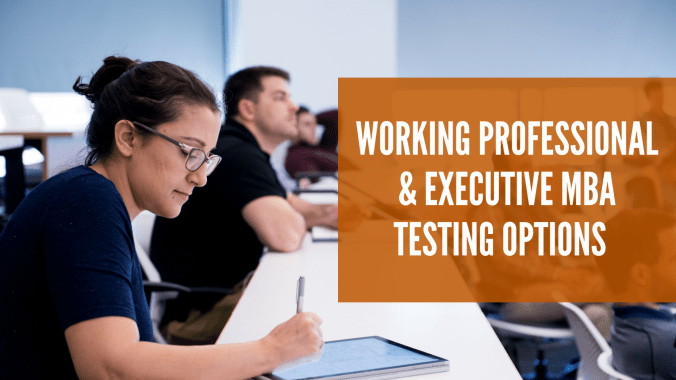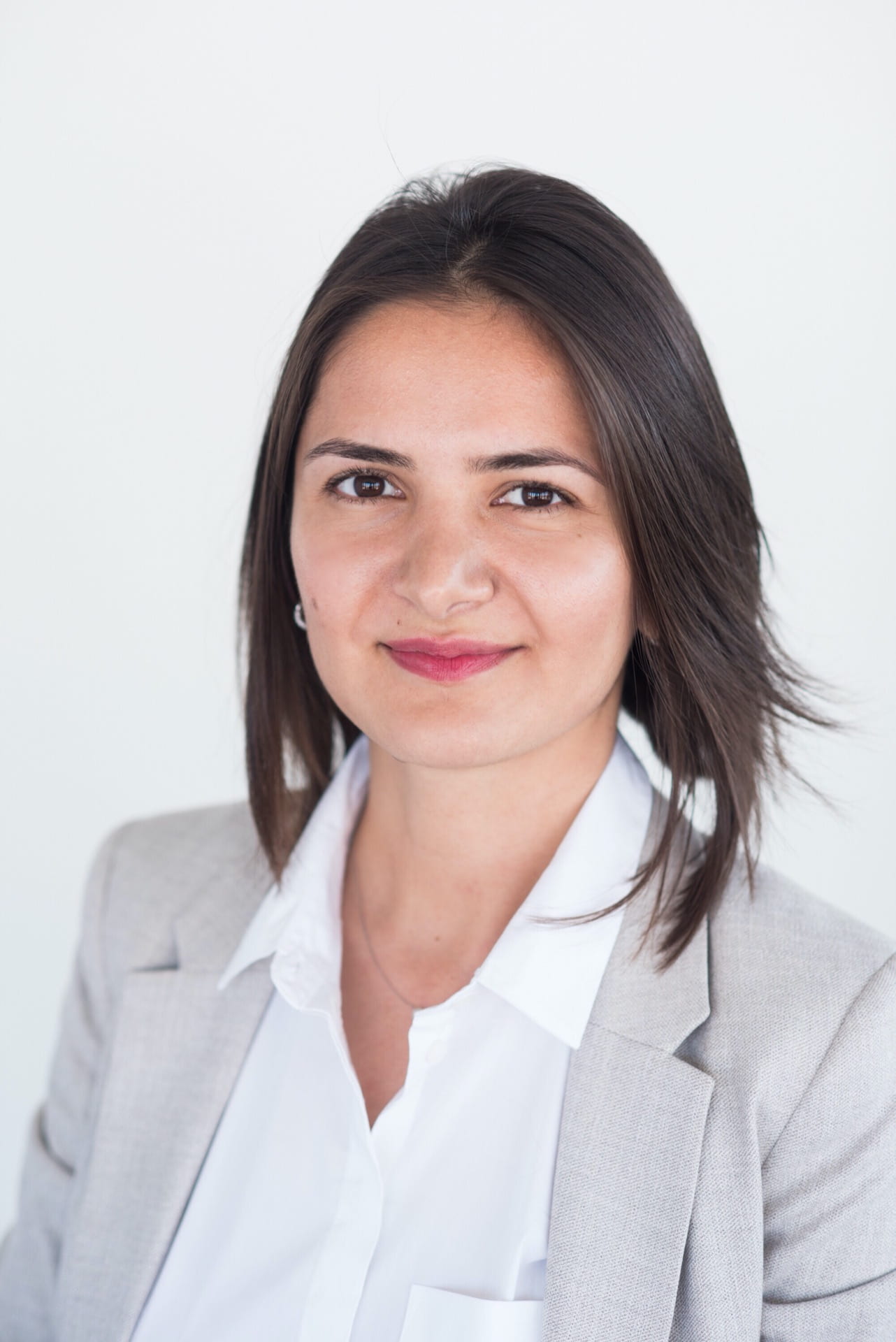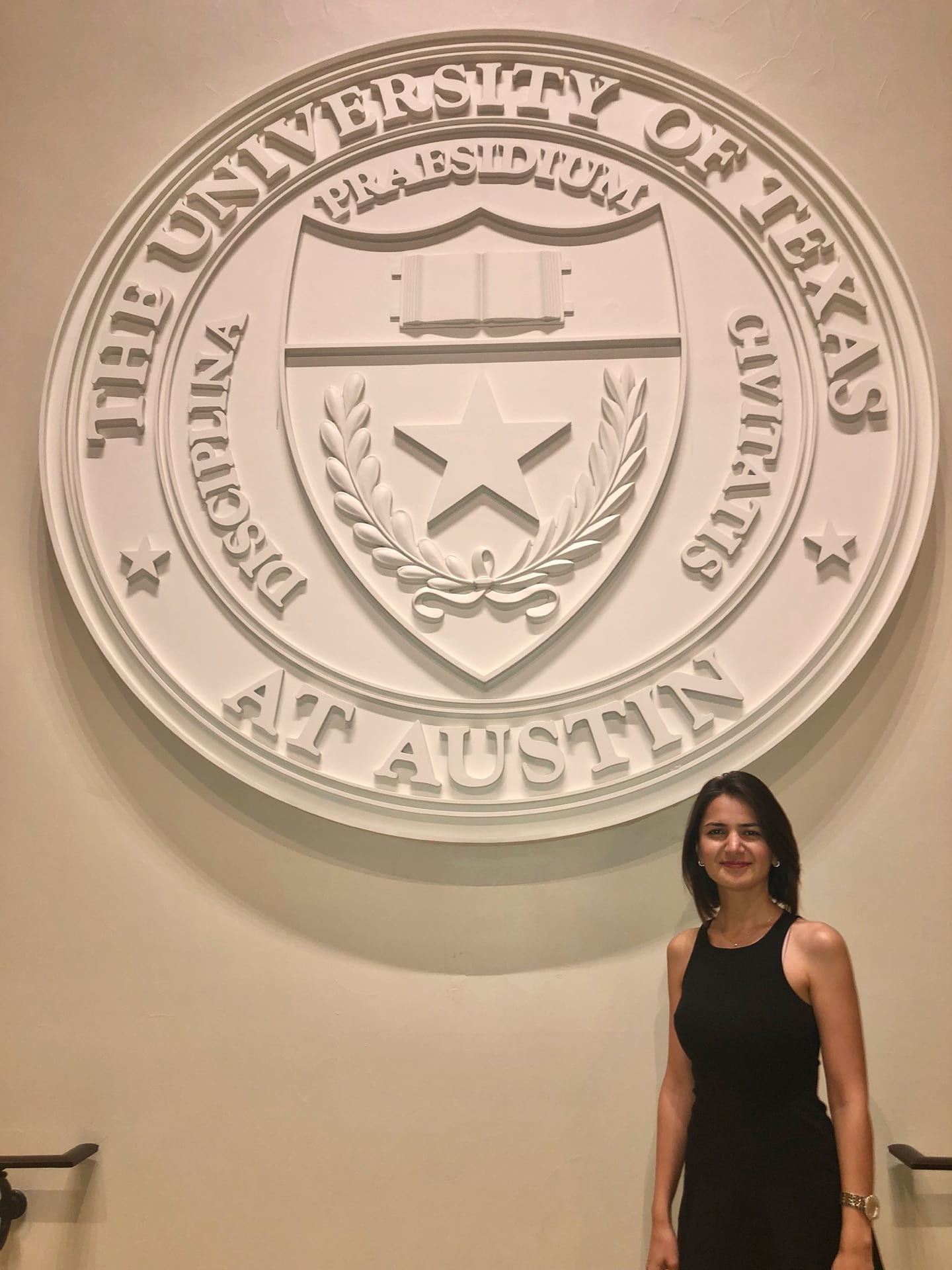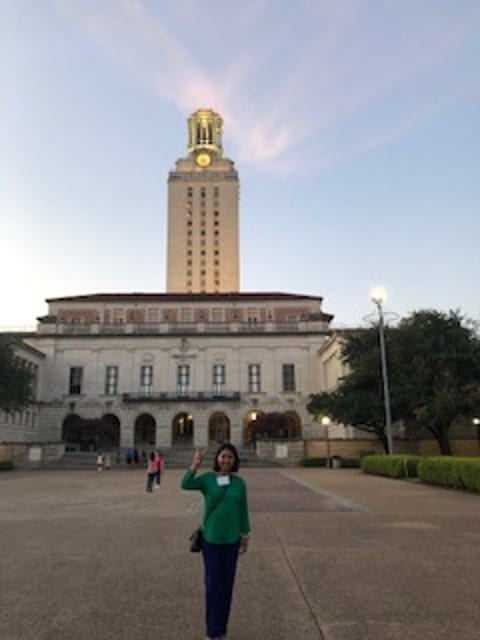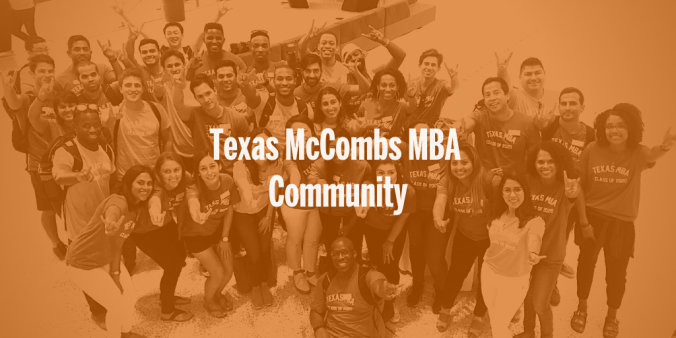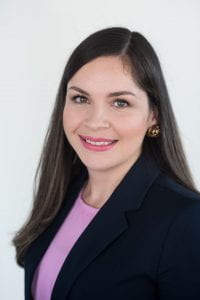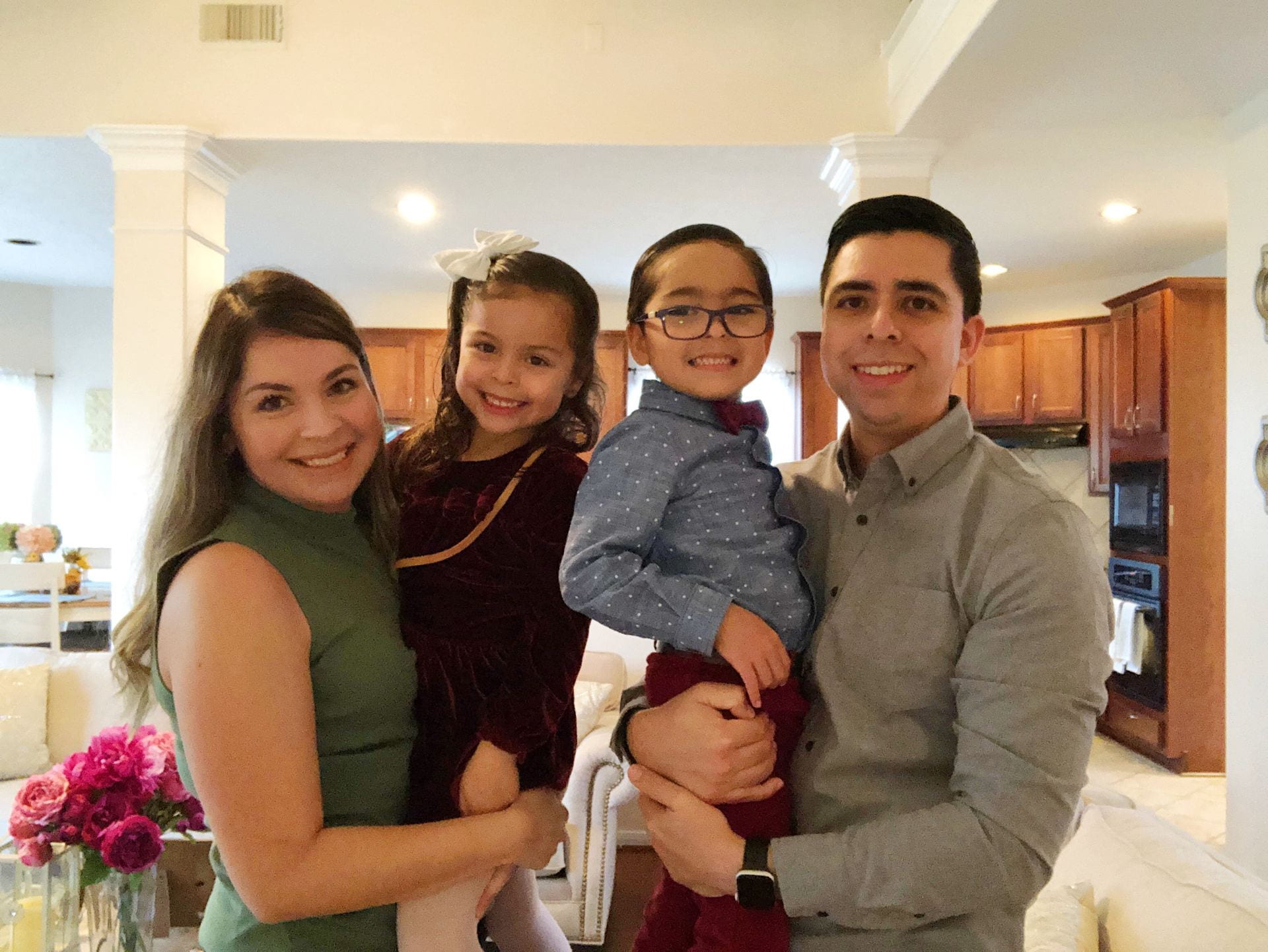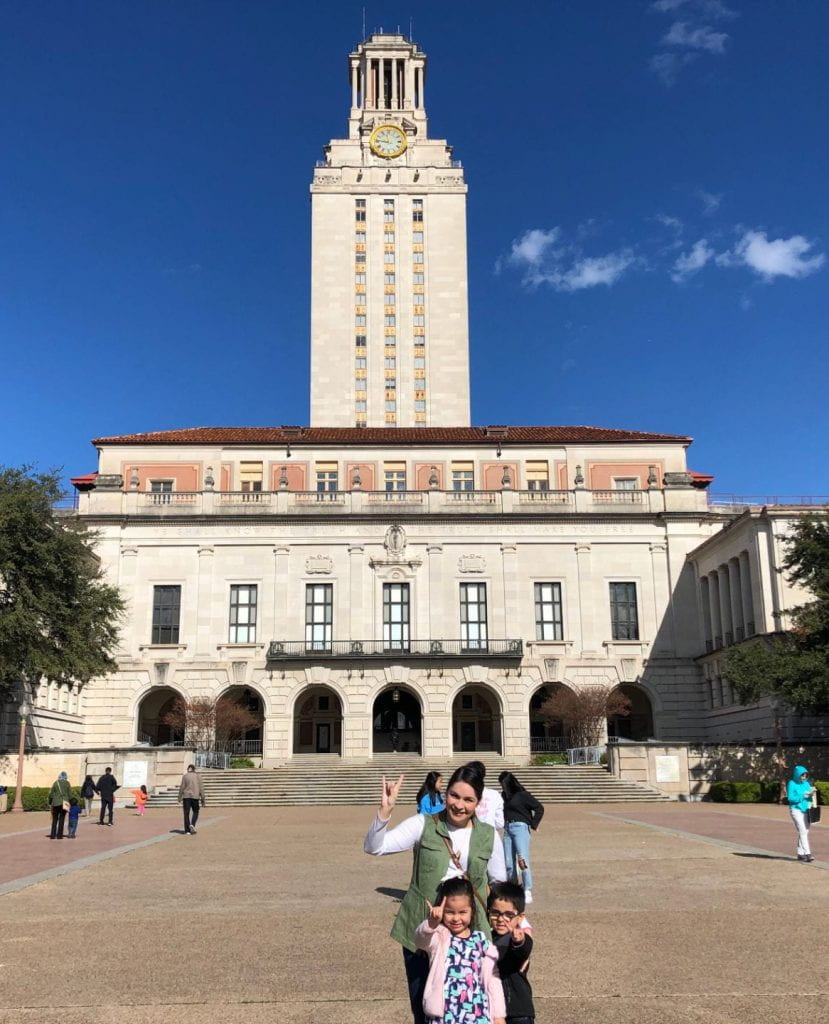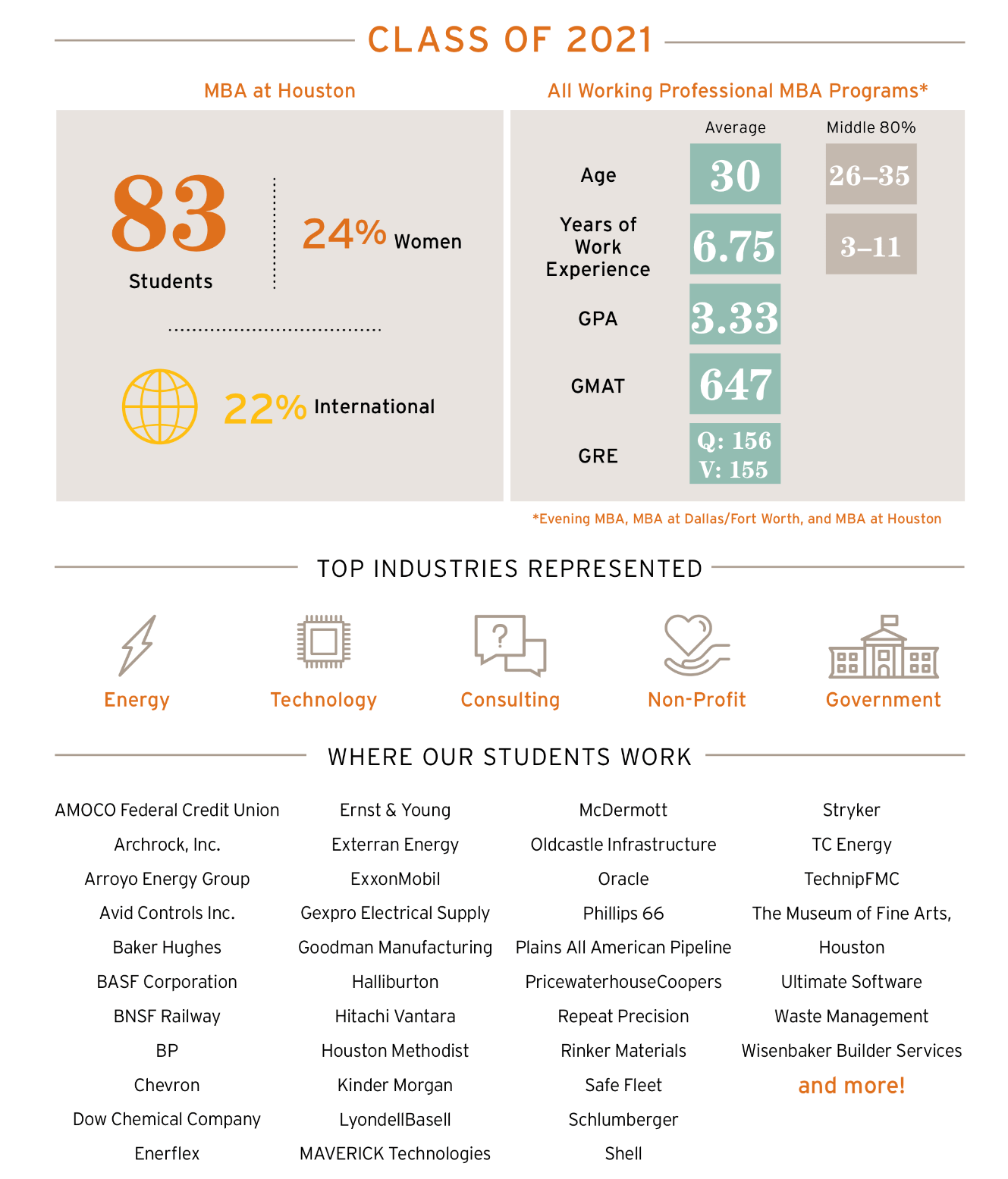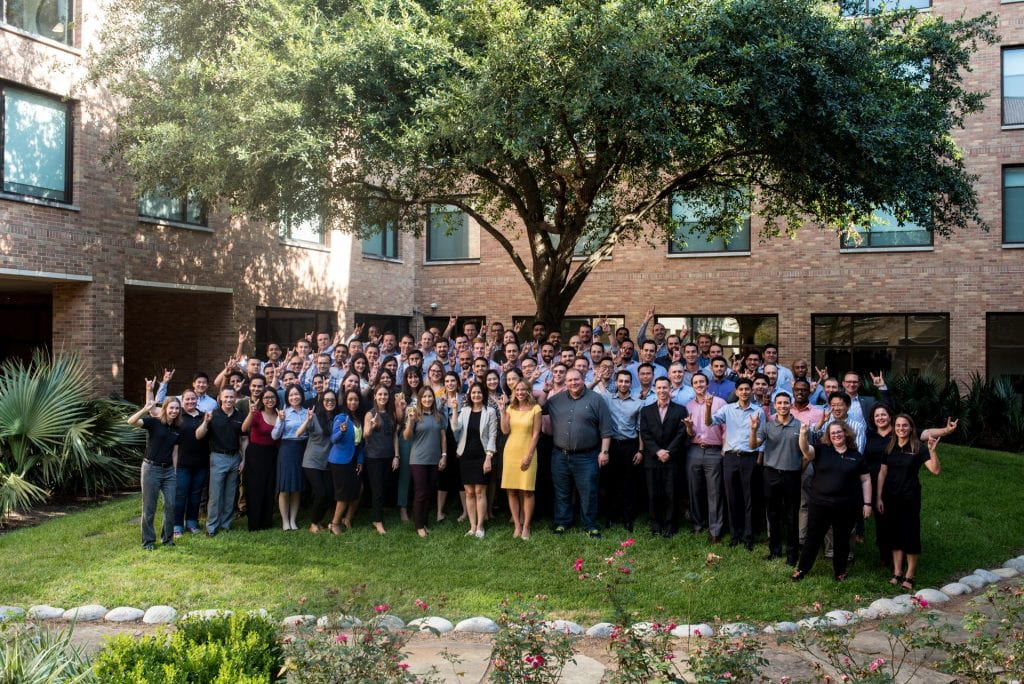Preparing for and taking an MBA admissions exam is one of the best ways to get your mind back into academic mode as you prepare for business school. Some of the most common questions we receive from MBA candidates are about the standardized tests. Texas McCombs MBA admissions is excited to share that working professional and executive MBA candidates have more options than ever before when considering how to complete the standardized test requirement in their application. All applicants are required to submit a GMAT, GRE, or Executive Assessment (EA). We will waive the testing requirement if:
- Expired (taken 5+ years ago) GMAT, GRE, or EA score
- General Test Waiver (merit-based) is approved
- COVID-19 Test Exception is approved
Standardized exams like the GRE, GMAT, EA, TOEFL, and IELTS help us to evaluate a candidate’s academic preparedness for the rigor of business school and is one metric used to compare candidates within a large pool of applicants.
In addition, studying for and taking the exam – for some, even taking it multiple times – can show the admissions committee your commitment to the competitive business school application process and how you may approach academic challenges as a student.
This post contains a lot of information, broken down into three sections:
- Test Options for Working Professional and Executive MBA Candidates
- Which Exam is Right for You?
- Impact of Your Test Score.
Test Options for Working Professional and Executive MBA Candidates
All applicants are required to submit a GMAT, GRE, or Executive Assessment (EA). We will waive the testing requirement if:
- Expired (taken 5+ years ago) GMAT, GRE, or EA score
- General Test Waiver (merit-based) is approved
- COVID-19 Test Exception is approved
Our admissions committee does not have a preference on which test you take and there is no minimum score.
Submitting Current GMAT, GRE, or EA Scores
For current scores, you must self-report your test scores in your application as well as have official score reports sent directly to UT Austin by the testing agency. The date that your official scores are sent to UT Austin by the testing agency should be no later than the application round deadline, as it can take up to 3-4 weeks for new scores to be processed. Note that if you are taking the GMAT, GRE, or EA online, you will want to allow up to two weeks to receive your score from the testing agency. You must have your test score in hand by the application deadline in order to submit your application.
Submitting Expired GRE, GMAT, or EA Scores
For expired scores (5 years or older), you must self-report your score and upload proof of the test score in the application. Examples of proof for expired test scores include a score report you received previously from the testing agency OR documentation from another educational institution that previously received the score (e.g. for another graduate/terminal degree application).
About the Executive Assessment (EA)
In 2016 GMAC (who also administers the GMAT exam) saw the need for a new exam, designed specifically for the needs of MBA applicants who have a significant amount of work experience. Originally conceived for Executive MBA programs, the Executive Assessment (EA) exam was launched. Today, almost 100 MBA programs, Full-Time, Professional, and Executive, accept the EA. Unlike the GMAT or GRE, the EA is a readiness exam and a benchmark for academic preparedness. More details about the EA exam can be found below.
General Test Waiver Petition
A merit-based test waiver is available by request prior to submitting your application. Waivers/Exceptions are not available for applicants who have already sent scores to UT.
For candidates who would like to request a merit-based test waiver:
- Submit the General Test Waiver petition form prior to submitting your application.
- The General Test Waiver petition form can be accessed directly (UT EID login required) or via the test scores section of the application.
- Waiver approval is merit-based and takes into account your work experience and academic history. Your resume and transcripts are required for consideration.
- A decision on your test waiver request will be shared within 5-10 business days after submission.
- Waivers/Exceptions are not available for applicants who have already sent scores to UT.
COVID-19 Test Exception Petition
A test exception is available if you have been directly affected by COVID-19 and are unable to take the exam in person or at home. Waivers/Exceptions are not available for applicants who have already sent sores to UT.
For candidates who would like to request a COVID-19 Test Exception:
- Request the COVID-19 test exception form by emailing TexasMBA@mccombs.utexas.edu.
- Submit the COVID-19 test exception form prior to submitting your application.
- The COVID-19 test exception is only for those applicants who are unable to take an exam in or at home for reasons directly related to COVID-19.
Which Exam is Right for You?
The Admissions Committee does not prefer one test over the other in terms of demonstrating your preparedness for business school, but it is important to think about which exam is best for you as an individual. There are different reasons to consider taking the GMAT vs the GRE vs the EA.
While the GMAT and GRE tests both have quantitative and verbal sections, they have noticeable differences. We encourage you to do your research and take practice tests to learn each test’s points of emphasis, and how they are scored.
Both The GMAT and GRE are adaptive, which means that your success in answering questions correctly has an impact on the future questions you are given. But the tests deliver adaptive questions in different ways.
- The GMAT is adaptive by question. When you get an answer correct, the next question is more difficult, and when you get an answer wrong, the next question is less difficult. This also means that once you answer a question, you can’t go back to that question.
- The GRE is adaptive by section. If you do well on the first verbal section, you get a more difficult version of the next verbal section and vice versa.
We have included some more details about the GMAT, GRE, and EA below, but if you are unsure which exam is best for you, here are our tips:
- We recommend taking some practice tests! There’s a chance you may be more comfortable with one test format over the other. At the end of the day, the choice of which exam to take is yours.
- Build in study time and leave yourself enough room on the calendar to retake an exam if necessary. If you’re not happy with your score, you can retake either test. While many candidates take the test only once thinking it will fulfill the requirement, others recognize that a second effort is likely to yield improvement. It comes at the cost of additional time and another test fee, but the payoff can be significant if it makes you a stronger candidate.
- Make sure you submit your application as confidently as possible and with a score you feel good about.
GMAT
For many years, the GMAT was the only standardized test accepted by business schools, but in the last decade, that has changed. Like Texas McCombs, many schools accept the GMAT, GRE, and EA with no preference for one test over another. However, it’s important to be aware that the GMAT is still used by most large consulting and investment banking companies as a baseline qualifier for the recruiting process. If consulting or I-banking are in your sights, this means that the GMAT is the best choice. The Fine Print: Not ALL consulting and investment banking firms look at your GMAT – boutique consulting firms, for example, typically do not ask for your score. So this is not a one-size-fits-all rule but is something to consider if those industries are of interest to you.
Exam Structure: The GMAT has only one section each of verbal and quantitative questions. Within each section, a handful of questions are experimental, however, you won’t know which questions count towards your score and which are experimental. The verbal section of the GMAT focuses on grammar (sentence correction) and reading comprehension. In the quantitative section, the GMAT questions center on problem-solving and data sufficiency– you will get some questions where you have to understand if you have enough data to reach a conclusive answer. The GMAT also includes an Integrated Reasoning section, which measures how well you use data to solve complex problems, and an Analytical Writing Assessment, which asks you to analyze an argument and communicate your critique of that argument through a written essay.
Scoring: The GMAT overall scoring range is 200-800, with verbal and quant sections scored on a scale of 6 to 51. The verbal and quant sections both count toward your overall score. The Integrated Reasoning and Analytical Writing sections are scored individually.
Preparation: The amount of time you need to study for the GMAT will be unique to your individual circumstances. However, on average, candidates report that they spend 3 – 6 months preparing for the GMAT exam. You can find more information and resources for GMAT preparation at MBA.com.
Time to Complete: 3.5 hours total (including two optional breaks) with 30 minutes for Analytical Writing, 30 minutes for Integrated Reasoning (12 questions), 62 minutes each for the quantitative section (31 questions), and 65 minutes for the verbal section (36 questions). The GMAT is considered the ultimate test of executive decision-making. Time is short and you only have one section of each format, so you must what questions are worth spending the most time on.
Cost: $250 – $275 USD depending on location
Delivery: The GMAT is delivered in-person at testing centers or online. You can take the GMAT once every 16 days, no more than five times in a rolling 12-month period, and no more than eight times total. Within the overall limit, you can only take the GMAT online exam up to two times.
Learn more about the GMAT at mba.com/exams.
GRE
Sometimes the GRE is the best choice for applicants who have already completed a Master’s degree or those who are pursuing their MBA in conjunction with other Master’s degrees, for example, our dual degree programs. Taking only the GRE allows you to apply to both programs separately with one score, a convenience factor that most dual-degree applicants very much appreciated.
Exam Structure: The GRE has two sections of verbal and two sections of quantitative questions, plus one additional section that could be either verbal or quantitative. This additional section is experimental– your responses won’t count toward your score – but like the GMAT, you don’t know which section is the experimental one. So you have to treat each section on its own as if it will count toward your score. The GRE is also known for having a tough vocabulary portion (antonyms, analogies, and sentence completion) in the verbal sections, along with reading comprehension. Quant questions focus more on geometry and data comparisons. Also, the GRE quant includes questions where more than one answer is correct, and you must select all of the correct answers to get credit for that question. The GRE does give you the use of an on-screen calculator, though this provides only basic arithmetic functions. The GRE also includes an Analytical Writing section, which includes an “Analyze a Task” question and one “Analyze an Argument” question.
Scoring: The GRE gives you one score for verbal and one score for quant, both ranging from 130 to 170. There is no total score for the GRE.
Preparation: Preparation time will vary based on your individual schedule and strengths. ETS offers a variety of free and low-cost tools to help you prepare for the GRE exam.
Time to Complete: The overall testing time for the GRE is about 3 hours and 45 minutes, consisting of 60 minutes for Analytical Writing, 60 minutes for two sections of Verbal Reasoning questions (20 questions per section), 70. minutes for two sections of Quantitative Reasoning (20 questions per section), along with some un-scored and research questions.
Cost: $205 USD
Delivery: The GRE can be taken at testing centers or online. You can take the GRE once every 21 days, up to five times within any continuous 12-month/365 day period.
Learn more about the GRE at ets.org/gre.
Executive Assessment (EA)
The Executive Assessment is a readiness exam and a benchmark for academic preparedness. It is designed specifically for busy, experienced professionals. Anyone is eligible to take the EA.
Exam Structure: There are three sections on the exam – quant, verbal, and integrated reasoning with the type of questions for quant and verbal on the EA being very similar to GMAT. The integrated reasoning section has four types of questions: multi-source reasoning, graphics interpretation, two-part analysis, and table analysis.
Scoring: The total score ranges from 100 to 200 with all three sections weighted equally (0-20).
Preparation: The EA was designed to require minimal preparation, but we recommend putting in enough prep to feel comfortable when you take the exam. On average, candidates put in 21-30 hours of prep time before taking the EA. This test is good option for busy working professionals looking for a way to demonstrate their MBA readiness without the rigorous preparation that the GMAT and GRE demands.
Exam Length: The test is shorter in duration compared to the GMAT and GRE. The test takes about 90 minutes to complete for 40 questions – 30 minutes for Integrated Reasoning (12 questions), 30 minutes for Verbal (14 questions), and 30 minutes for Quant (14 questions).
Cost: $350 USD
Delivery: The Executive Assessment is available both online and in-person at test centers worldwide making the assessment available around the clock to ensure you meet your application deadlines. You can take the Executive Assessment up to two times.
Learn more about the EA at gmac.com/executive-assessment.
Impact of Your Test Score
Future Employment
Before you make a final decision on your testing options, it’s best to research some of your target companies or industries and determine two things:
- The extent to which they evaluate a test score in reviewing job candidates.
- Whether they have a preference for one of the tests. At McCombs, we have found that most consulting and investment banking firms do look at the candidate’s test scores, and both industries historically have favored the GMAT.
Regardless of which test you take, you should consider it as another opportunity to not only impress the Admissions Committee, but also potential employers.
Academic History
Does your undergraduate or graduate transcript accurately reflect your academic ability? If your GPA is low, and you do not submit a strong test score, the admissions committee may have concerns about your ability to succeed in the rigorous MBA curriculum.
One other factor to consider is whether or not your quantitative ability shines elsewhere in your application. While many of our MBA students come to McCombs from non-quantitative majors, these applicants are typically able to prove their quantitative prowess through their test scores. If you come from a non-quantitative background and do not submit a strong test score, you will need to find other areas within your background or experience that can demonstrate your quantitative skills. At the end of the day, we want to make sure that you are set up to succeed academically in the program. If the admissions committee has concerns about your quantitative ability, it may impact your chance of admission, or you may be required to complete pre-MBA coursework prior to admission and/or prior to enrollment.
Scholarships
Scholarship awards are competitive and limited in number. Scholarship decisions are based on a longstanding holistic review process that takes into account your entire application and serves to assess the overall strength of your candidacy, including readiness for academic rigor, career goals, leadership potential, and fit with our program culture. Submitting an application without a strong test score may limit the information available to award a merit-based scholarship.
Please reach out to the MBA Admissions Team with any questions.
Good luck and Hook ’em!
